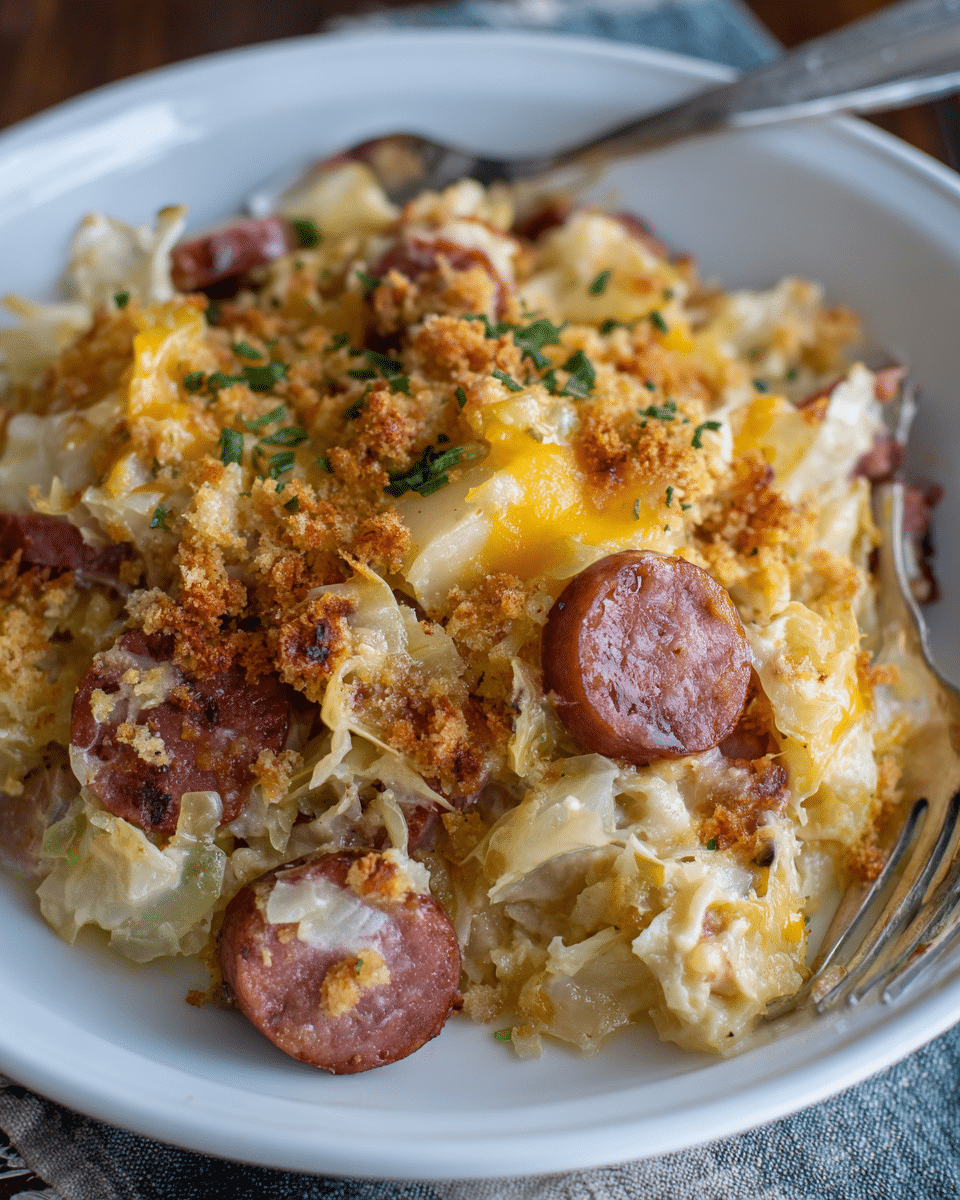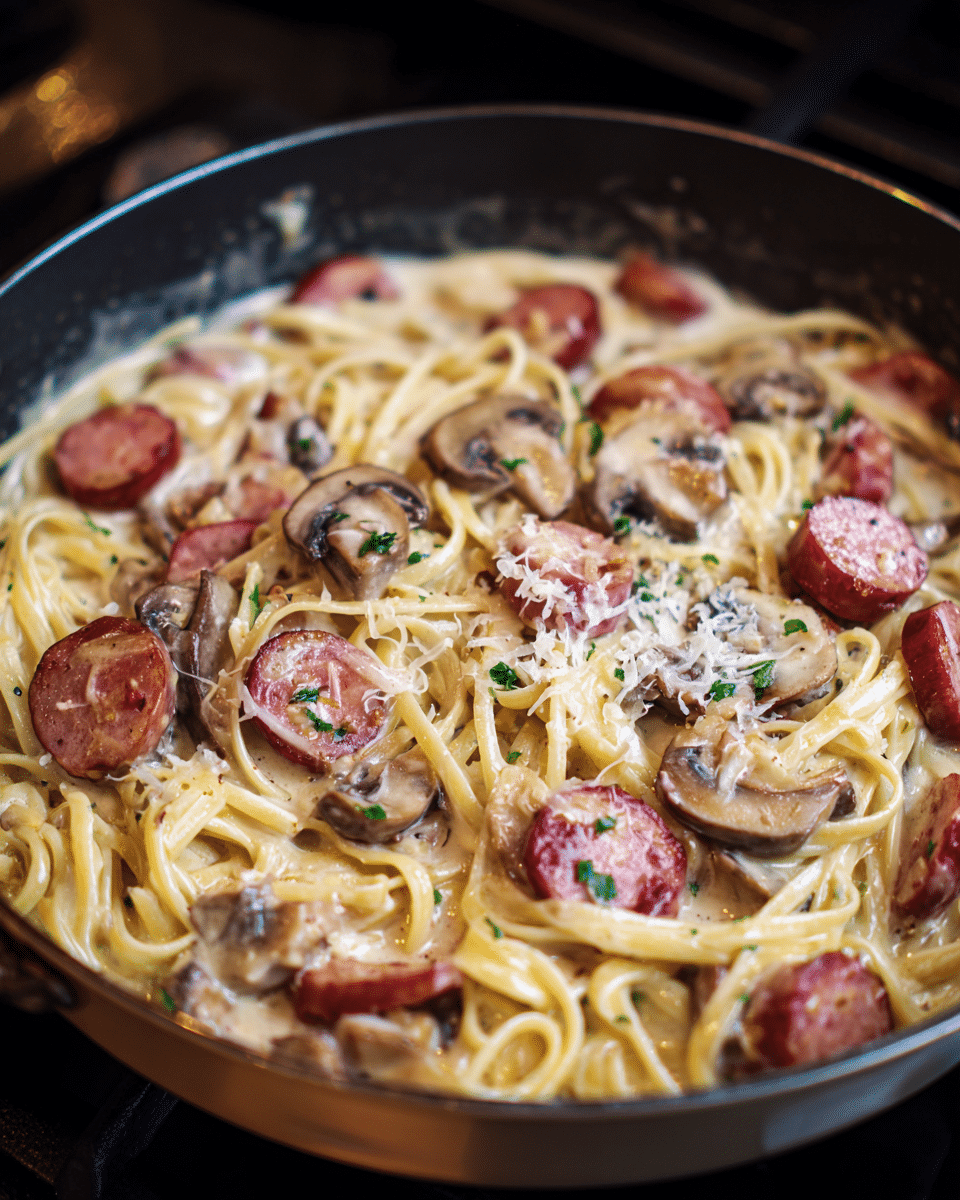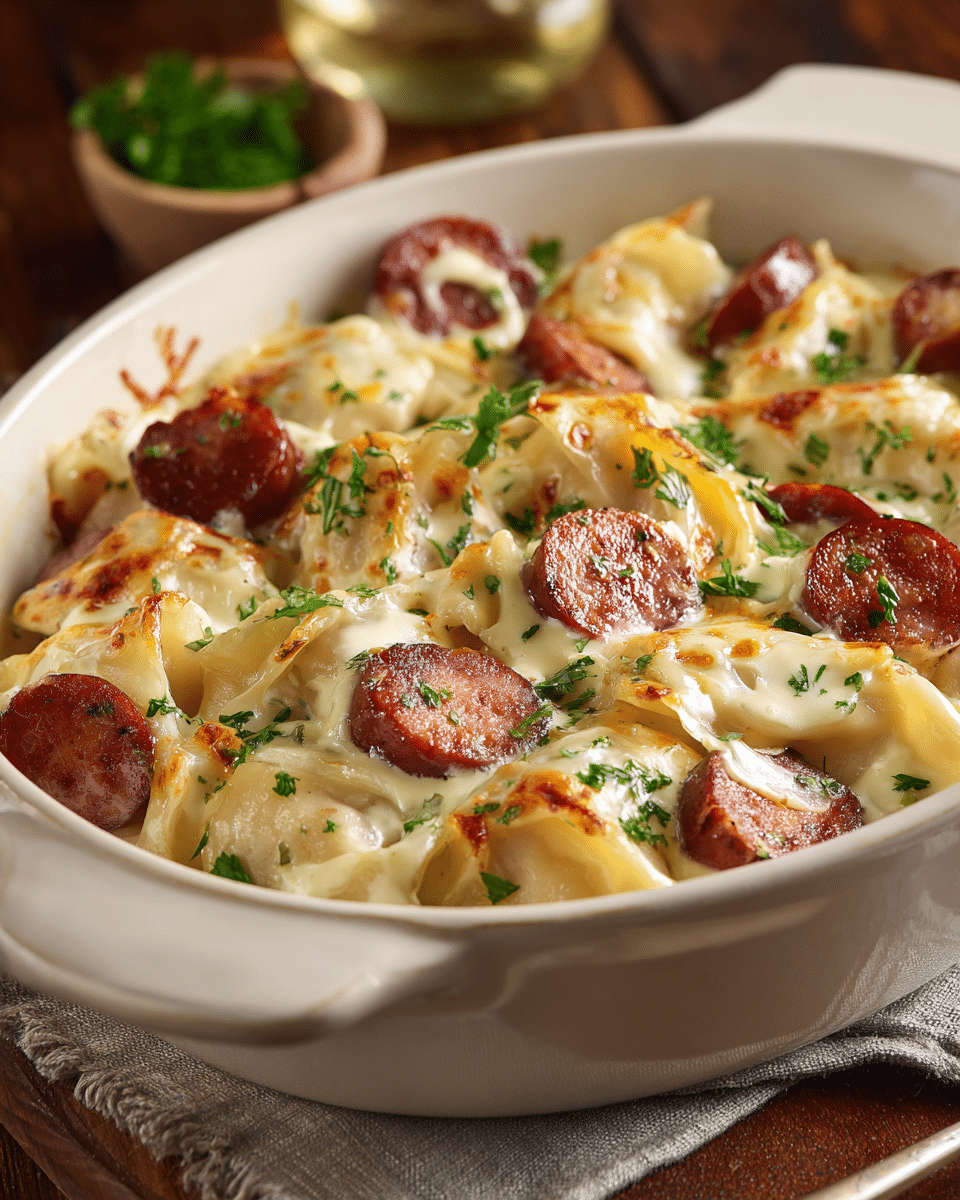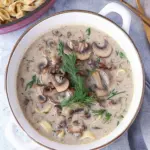Kielbasa and Cabbage Casserole is a hearty and comforting one-dish meal that combines savory smoked sausage, tender cabbage, and potatoes in a creamy, flavorful sauce. Popular in Eastern European cuisine, this dish offers a rustic yet satisfying balance of protein and vegetables. It’s ideal for weeknight dinners, especially during the colder months, and pairs well with crusty bread or a simple salad.
FULL RECIPE
Ingredients
- 1 lb kielbasa sausage, sliced into ¼-inch rounds
- 1 medium head of green cabbage, chopped
- 3 medium potatoes, peeled and diced
- 1 medium onion, chopped
- 2 cloves garlic, minced
- 2 tablespoons butter
- 1 cup sour cream
- 1 cup shredded cheddar cheese
- ½ cup chicken broth
- 1 tablespoon Dijon mustard
- 1 teaspoon paprika
- ½ teaspoon black pepper
- Salt to taste
- ½ cup breadcrumbs (optional, for topping)
- 2 tablespoons olive oil
Directions
- Preheat oven to 375°F (190°C). Lightly grease a 9×13-inch baking dish.
- Cook the kielbasa in a large skillet over medium heat until browned, about 5–7 minutes. Remove and set aside.
- In the same skillet, add olive oil and sauté onions until translucent, about 3 minutes. Add garlic and cook for 1 minute more.
- Add cabbage and cook for 8–10 minutes, stirring often, until it begins to soften and reduce in volume.
- Add potatoes to the skillet along with chicken broth, paprika, mustard, black pepper, and salt. Cover and cook for about 10 minutes or until the potatoes are slightly tender.
- Remove from heat and stir in sour cream and half of the cheddar cheese. Mix until evenly combined.
- Fold in the cooked kielbasa slices. Transfer the mixture to the prepared baking dish.
- Sprinkle with the remaining cheddar cheese and breadcrumbs if using. Dot with butter on top.
- Bake uncovered for 25–30 minutes or until the top is golden and the casserole is bubbling around the edges.
- Let it rest for 5 minutes before serving.
Nutrition Facts
- Calories: 450
- Total Fat: 32g
- Saturated Fat: 13g
- Cholesterol: 75mg
- Sodium: 890mg
- Total Carbohydrates: 25g
- Dietary Fiber: 4g
- Sugars: 5g
- Protein: 16g
- Vitamin A: 15% DV
- Vitamin C: 60% DV
- Calcium: 20% DV
- Iron: 10% DV
Flavor Profile and Comfort Appeal
Kielbasa and Cabbage Casserole delivers a harmonious balance of rich, smoky, creamy, and savory flavors, making it an ideal comfort food. The smokiness of the kielbasa is complemented by the mild sweetness of sautéed cabbage and onions, while the addition of sour cream and cheese introduces a velvety texture and depth. Potatoes contribute heartiness, turning this into a one-dish meal that satisfies both hunger and palate. This dish exemplifies the kind of home-cooked meals that evoke warmth, nostalgia, and the cozy ambiance of family dinners.
Cultural Significance
Rooted in Eastern European culinary traditions, this casserole reflects the resourceful use of preserved meats and hardy vegetables like cabbage and potatoes. Kielbasa, a Polish-style smoked sausage, is a staple in many Slavic households and frequently appears in stews, casseroles, and grilled meals. The combination of cabbage and sausage has long been a beloved pairing in Polish, Ukrainian, and German cuisines. By transforming this classic into a casserole, the dish becomes more versatile and modern while preserving its old-world charm.
Nutritional Benefits
This casserole offers a blend of macronutrients and essential vitamins. Cabbage is high in fiber and vitamin C, promoting digestion and immune support, while potatoes provide complex carbohydrates for sustained energy. Kielbasa contributes protein and B vitamins, especially B12. Sour cream and cheese add calcium and vitamin D but should be consumed in moderation due to saturated fat content. When served in controlled portions, this meal can be part of a balanced diet, especially when paired with a light side dish such as a leafy green salad.
Dietary Modifications
For those seeking a lighter or healthier version of this dish, there are several simple adjustments. Low-fat sour cream and reduced-fat cheddar cheese can be used to cut down on saturated fat and calories. Turkey kielbasa or plant-based sausage alternatives can substitute traditional pork kielbasa to reduce cholesterol and processed meat intake. Swapping in sweet potatoes or cauliflower instead of white potatoes increases fiber and beta-carotene levels. For a gluten-free variation, omit the breadcrumbs or use certified gluten-free options.
Texture and Cooking Techniques
Texture plays a key role in the enjoyment of this casserole. Achieving a golden-brown crust from the cheese and optional breadcrumb topping contrasts beautifully with the soft interior made up of tender cabbage and potatoes. Browning the kielbasa before incorporating it enhances flavor through caramelization. Par-cooking the potatoes ensures they’re fully cooked after baking, and sautéing the vegetables before assembling the casserole builds layers of flavor. These steps turn basic ingredients into a cohesive, mouthwatering dish.
Serving Suggestions
Kielbasa and Cabbage Casserole is a complete meal on its own but shines even more when paired thoughtfully. A crisp green salad with a tangy vinaigrette can balance the casserole’s richness. For a heartier presentation, serve it alongside a slice of crusty rye or sourdough bread. A light apple slaw or pickled vegetables can offer acidity to cut through the creaminess. It’s also a popular candidate for potlucks and holiday gatherings, where its rustic appearance and satisfying taste make it a crowd favorite.
Storage and Reheating Tips
This casserole stores well and can be prepared in advance. Once cooled, it should be tightly wrapped or transferred to an airtight container and stored in the refrigerator for up to four days. To reheat, bake covered in a 350°F (175°C) oven until warmed through, or microwave individual servings on medium power to avoid drying out. It can also be frozen before baking, making it a convenient make-ahead meal. When ready to serve, allow it to thaw overnight in the fridge before baking as directed.
Make-Ahead and Meal Prep Value
Kielbasa and Cabbage Casserole is perfect for meal prep enthusiasts. The components—sautéed vegetables, cooked sausage, and cheese mixture—can be prepared a day in advance and assembled just before baking. It’s also easy to double the recipe and portion it into meal-sized containers for grab-and-go lunches or quick dinners. Because the ingredients hold up well over time, the flavors tend to deepen after a day or two, making leftovers just as appealing, if not more flavorful, than the first serving.
Creative Variations
There are countless ways to customize this casserole based on preference or dietary needs. For a German-style twist, add a splash of apple cider vinegar or thinly sliced apples for a sweet-tangy contrast. A spicy version can include hot Hungarian paprika or diced jalapeños. To turn it into a one-pan breakfast dish, crack a few eggs over the top before the final bake. Adding cooked grains like quinoa or barley can boost fiber and add a nutty note. For a vegetarian option, replace kielbasa with seasoned lentils or mushrooms.
Seasonal and Regional Adaptability
This casserole is highly adaptable to seasonal and local ingredients. In autumn, add root vegetables like parsnips or carrots for added sweetness. In spring, incorporate tender green cabbage or spinach for a fresher taste. Depending on your region, you might use locally made sausages, different cheese varieties, or even smoked tofu for unique flavor infusions. The flexible nature of the dish makes it ideal for customizing according to availability, cultural preference, or seasonal cravings.
Conclusion
Kielbasa and Cabbage Casserole stands out as a satisfying, customizable, and deeply comforting dish with roots in traditional European cuisine and appeal for modern households. Whether you’re looking for an easy weeknight dinner, a make-ahead family favorite, or a versatile potluck option, this casserole fits the bill. With its ability to adapt to various dietary needs, flavor preferences, and regional ingredients, it invites creativity while staying grounded in its humble, hearty origins.








